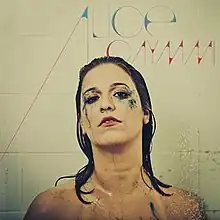Alice Caymmi (album)
Alice Caymmi is the debut album by Brazilian artist of same name, released in 2012, produced by Flávio Mendes, with Caymmi being the art director herself.[1] She described the album as follows: "The album has an aquatic environment, a reference to my grandfather (Dorival Caymmi), to the mythic sea he created. But I like the more obscure things. I brought the more tragic side of his songs, the night sea, darker. [...] Not that I feel I am the avant-guarde-ist, but I want out of the comfort zone. I could have made the album one would expect from the young granddaughter of Caymmi. But there would be no album, it wouldn't be so emotional. For this album, I wanted the noise, the noise language. I don't think I made it, because the songs didn't have this head. But I tried to bring them to this tragic, noisy environment of sea, of night".[2] Originally, the album would be entirely performed by Alice alone and would feature seven tracks. However, producer Flávio Mendes convinced her to enlarge the track list and invite more musicians.[2]
| Alice Caymmi | ||||
|---|---|---|---|---|
 | ||||
| Studio album by | ||||
| Released | August 27, 2012 | |||
| Genre | Música popular brasileira | |||
| Length | 28:03 | |||
| Label | Kuarup / Sony Music | |||
| Producer | Flávio Mendes | |||
| Alice Caymmi chronology | ||||
| ||||
Some of the lyrics were composed during her adolescence. There are two covers in the album, "Sargaço Mar" and "Unravel". The first was composed by her grandfather. She describes it as "a song that is independent of harmony, just her melody already shows what it is. I then tried to acclimatize it in a scenic way. [...] If I had it my way, it would open the album, my career, everything".[2] "Unravel" was originally performed by Icelandic singer Björk – about this version, the European singer supposedly said in her website that "there's no way of doing it better than that",[3] making Alice cry for her acknowledgment.[4]
Critical reception
| Review scores | |
|---|---|
| Source | Rating |
| Miojo Indie | |
| Blog Notas Musicais | |
Writing in his blog Notas Musicais, reviewer Mauro Ferreira praised the album and said Alice "reveals herself as an artist that has her own identity", despite the covers and the surname. Cleber Facchi, from Miojo Indie, saw similarities between Alice and her grandfather would be inspired by the sea to compose, but he also identified an own light in the singer, concluding that "even without knowing about the future, Caymmi sails confidently, fearless of what she might encounter ahead."
Track listing
All tracks are written by Alice Caymmi, except where noted
| No. | Title | Length |
|---|---|---|
| 1. | "Água Marinha" (Sea Water; co-written by Paulo César Pinheiro) | 2:31 |
| 2. | "Arco da Aliança" (Alliance Arch) | 3:21 |
| 3. | "Mater Contínua" | 3:21 |
| 4. | "Revés" (Setback) | 3:06 |
| 5. | "Sangue, Água e Sal" (Blood, Water and Salt; co-written by Pinheiro) | 3:12 |
| 6. | "Rompante" (Outburst) | 2:40 |
| 7. | "Vento Forte" (Strong Wind) | 3:17 |
| 8. | "Sargaço Mar" (Dorival Caymmi) | 2:04 |
| 9. | "Tudo Que For Leve" (All That is Light) | 3:11 |
| 10. | "Unravel" (Björk/Guy Sigsworth) | 2:30 |
| Total length: | 28:03[6] | |
Personnel
- Alice Caymmi — vocais on all tracks; acoustic guitar on "Revés"
- Alexandre Moreira — backing vocals and moogerfooger on "Tudo Que For Leve"
- Bela Meirelles — declamation on "Revés"
- Rafael Rocha — guitar, acoustic guitar, steel guitar on "Água Marinha"; drums on "Arco da Aliança", "Rompante" and "Vento Forte"; percussion on "Arco da Aliança", "Revés", "Rompante" and "Vento Forte"; electronic effects on "Arco da Aliança", "Revés", "Rompante" and "Sargaço Mar"; atabaques on "Sangue, Água e Sal"
- Flávio Mendes — backing vocals on "Tudo Que For Leve"; acoustic guitar on "Sangue, Água e Sal", "Vento Forte" and "Tudo Que For Leve"; arpeggiator on "Água Marinha"; steel guitar "Arco da Aliança", "Mater Continua", "Rompante", "Sangue, Água e Sal" and "Vento Forte"; piano on "Unravel"; conducting on "Mater Continua" and "Sangue, Água e Sal"; animoog on "Vento Forte", "Tudo Que For Leve" and "Unravel"
- Alberto Continentino — bass on "Arco da Aliança", "Rompante" and "Vento Forte"
- Murilo O'Reilly — percussion on "Água Marinha", efeitos eletrônicos on "Sargaço Mar"
- Fabiano Salek — percussion on "Tudo Que For Leve"
- Itamar Assiere — accordion on "Arco da Aliança" and "Rompante", Fender Rhodes piano on "Arco da Aliança", "Rompante" and "Vento Forte"
- Gretel Paganini — cellos on "Mater Continua", "Rompante" and "Sangue, Água e Sal"
- Tina Werneck — steel violas on "Mater Continua" and "Sangue, Água e Sal"
References
- Mauro Ferreira (15 September 2012). "Sem tirar onda por ser Caymmi, Alice debuta bem na sua praia particular". Mauro Ferreira. Retrieved 15 September 2014.
- Lichote, Leonardo (17 September 2012). "Em disco de estreia, Alice Caymmi navega além da zona de conforto". O Globo. Grupo Globo. Retrieved 26 May 2015.
- Alvim, Bossuet (19 October 2015). "Sem depender de herança musical, Alice Caymmi transforma MPB em pop experimental". Divirta-se. Diários Associados. Retrieved 29 October 2015.
- Santo, José Julio de Espirito (12 March 2015). "Alice Caymmi respeita e admira o legado familiar, mas não quer ficar presa ao próprio sobrenome". Rolling Stone Brasil. Grupo Spring de Comunicação. Retrieved 25 May 2015.
- Facchi, Cleber (6 November 2012). "Disco: "Alice Caymmi", Alice Caymmi". Miojo Indie. Retrieved 26 May 2015.
- "Alice Caymmi". iTunes. Apple. Retrieved 18 February 2015.